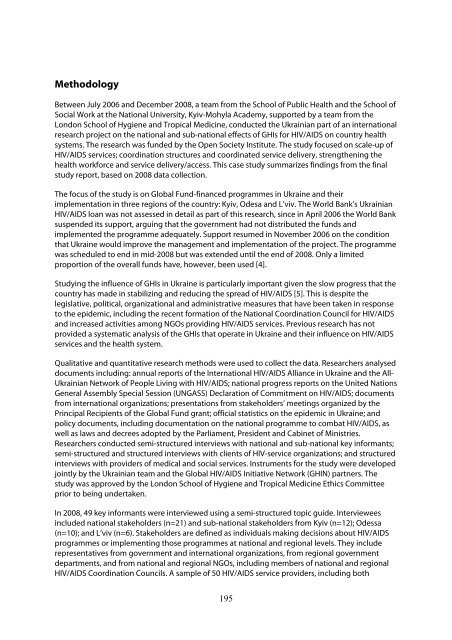MAXIMIZING POSITIVE SYNERGIES - World Health Organization
MAXIMIZING POSITIVE SYNERGIES - World Health Organization
MAXIMIZING POSITIVE SYNERGIES - World Health Organization
You also want an ePaper? Increase the reach of your titles
YUMPU automatically turns print PDFs into web optimized ePapers that Google loves.
Methodology<br />
Between July 2006 and December 2008, a team from the School of Public <strong>Health</strong> and the School of<br />
Social Work at the National University, Kyiv-Mohyla Academy, supported by a team from the<br />
London School of Hygiene and Tropical Medicine, conducted the Ukrainian part of an international<br />
research project on the national and sub-national effects of GHIs for HIV/AIDS on country health<br />
systems. The research was funded by the Open Society Institute. The study focused on scale-up of<br />
HIV/AIDS services; coordination structures and coordinated service delivery, strengthening the<br />
health workforce and service delivery/access. This case study summarizes findings from the final<br />
study report, based on 2008 data collection.<br />
The focus of the study is on Global Fund-financed programmes in Ukraine and their<br />
implementation in three regions of the country: Kyiv, Odesa and L’viv. The <strong>World</strong> Bank’s Ukrainian<br />
HIV/AIDS loan was not assessed in detail as part of this research, since in April 2006 the <strong>World</strong> Bank<br />
suspended its support, arguing that the government had not distributed the funds and<br />
implemented the programme adequately. Support resumed in November 2006 on the condition<br />
that Ukraine would improve the management and implementation of the project. The programme<br />
was scheduled to end in mid-2008 but was extended until the end of 2008. Only a limited<br />
proportion of the overall funds have, however, been used [4].<br />
Studying the influence of GHIs in Ukraine is particularly important given the slow progress that the<br />
country has made in stabilizing and reducing the spread of HIV/AIDS [5]. This is despite the<br />
legislative, political, organizational and administrative measures that have been taken in response<br />
to the epidemic, including the recent formation of the National Coordination Council for HIV/AIDS<br />
and increased activities among NGOs providing HIV/AIDS services. Previous research has not<br />
provided a systematic analysis of the GHIs that operate in Ukraine and their influence on HIV/AIDS<br />
services and the health system.<br />
Qualitative and quantitative research methods were used to collect the data. Researchers analysed<br />
documents including: annual reports of the International HIV/AIDS Alliance in Ukraine and the All-<br />
Ukrainian Network of People Living with HIV/AIDS; national progress reports on the United Nations<br />
General Assembly Special Session (UNGASS) Declaration of Commitment on HIV/AIDS; documents<br />
from international organizations; presentations from stakeholders’ meetings organized by the<br />
Principal Recipients of the Global Fund grant; official statistics on the epidemic in Ukraine; and<br />
policy documents, including documentation on the national programme to combat HIV/AIDS, as<br />
well as laws and decrees adopted by the Parliament, President and Cabinet of Ministries.<br />
Researchers conducted semi-structured interviews with national and sub-national key informants;<br />
semi-structured and structured interviews with clients of HIV-service organizations; and structured<br />
interviews with providers of medical and social services. Instruments for the study were developed<br />
jointly by the Ukrainian team and the Global HIV/AIDS Initiative Network (GHIN) partners. The<br />
study was approved by the London School of Hygiene and Tropical Medicine Ethics Committee<br />
prior to being undertaken.<br />
In 2008, 49 key informants were interviewed using a semi-structured topic guide. Interviewees<br />
included national stakeholders (n=21) and sub-national stakeholders from Kyiv (n=12); Odessa<br />
(n=10); and L’viv (n=6). Stakeholders are defined as individuals making decisions about HIV/AIDS<br />
programmes or implementing those programmes at national and regional levels. They include<br />
representatives from government and international organizations, from regional government<br />
departments, and from national and regional NGOs, including members of national and regional<br />
HIV/AIDS Coordination Councils. A sample of 50 HIV/AIDS service providers, including both<br />
195

















